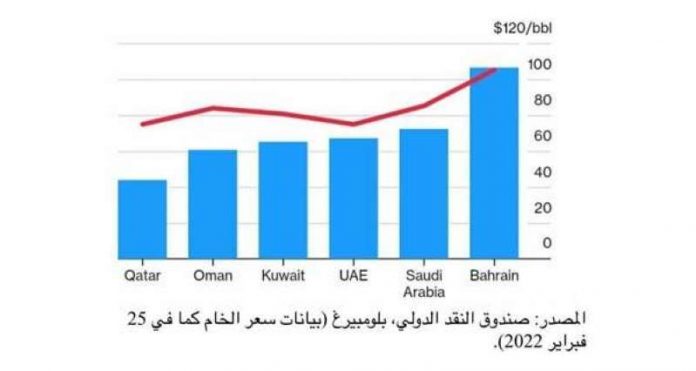Rising oil prices have pushed crude above the financial break-even point for almost all energy producers in the Middle East, raising the possibility of large budget surpluses even in the weakest economies if prices remain high.
Al-Rai quoting Bloomberg added that the Russian invasion of Ukraine led to the raising of crude oil prices to more than $ 105 a barrel for the first time since 2014, which extended the gains of these countries, noting that events in Europe mean that OPEC member countries such as Saudi Arabia and the UAE are ready for greater sudden gains. There is also a chance for Bahrain, the region’s smallest economy, to record a balanced budget for the first time since 2008 — if crude oil remains elevated.
The price of Brent crude jumped more than 9 percent in the hours after President Vladimir Putin ordered Russian forces to strike Ukraine.
The International Monetary Fund estimates that prices at this level will ensure that all major oil producers in the Middle East, with the exception of Bahrain, run a budget surplus.
Saudi Arabia, which needs oil at around $72 a barrel to balance the budget, has said it expects to post a surplus this year. For the UAE, this figure is about $67 a barrel. Bahrain needs prices of more than $106 a barrel.
Ziad Daoud, chief emerging market economist at Bloomberg Economics, said: “The oil price reaching $100 a barrel is a boon for the GCC countries. Very few people thought we would return to that level — the price hike — after the drop in 2014. It will allow governments to spend more and build up their foreign exchange reserves.”
Mohammed Abu Basha, head of macroeconomic research at the investment bank EFG Hermes, said that the price jump would boost confidence, compensate for balance sheets and support the recovery of Gulf economies.
He added that investors would also find “a safe haven in pegging Gulf currencies to the dollar from the increased risks of emerging currencies amid a complex environment of high inflation and the possibility of global central banks tightening monetary policies.”
However, Bloomberg says, the increased focus on fiscal discipline after a period of relatively low oil prices means that Gulf states are unlikely to increase spending.
In Saudi Arabia, the world’s largest oil exporter, officials pledged to use windfall gains to prepare for the future. This is part of efforts to diversify the economy as climate change drives adoption of technology that does not burn fossil fuels.

















